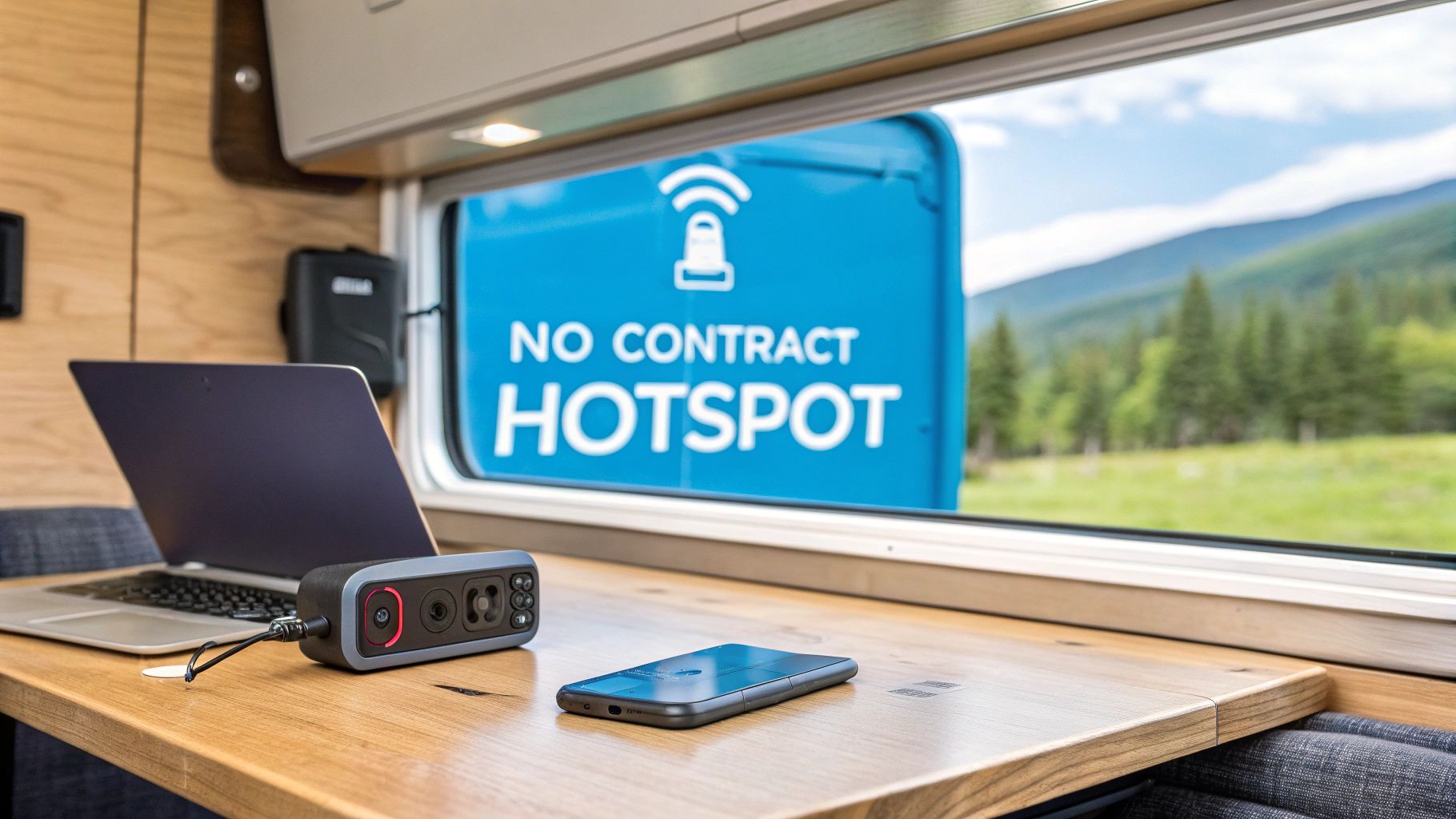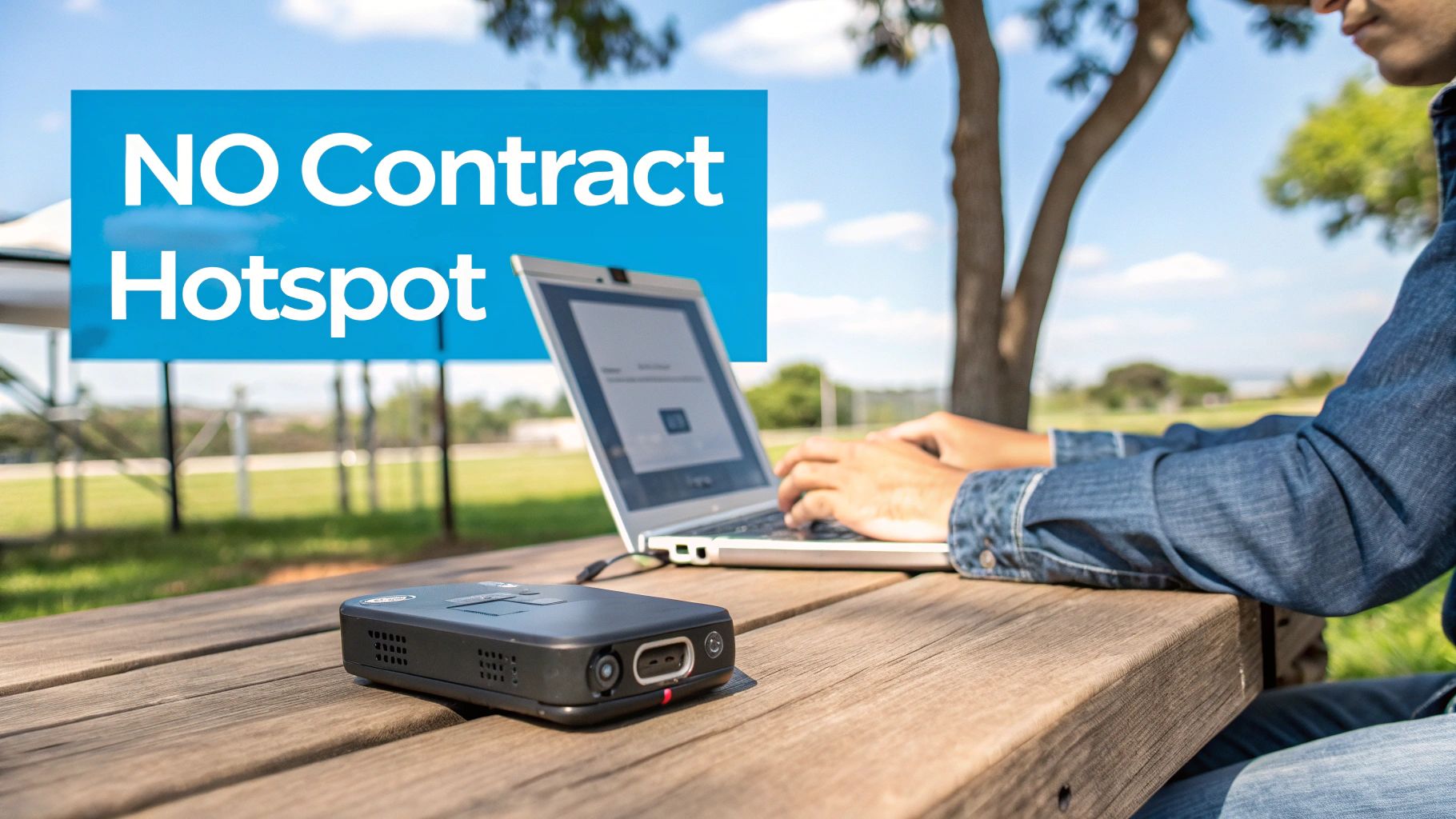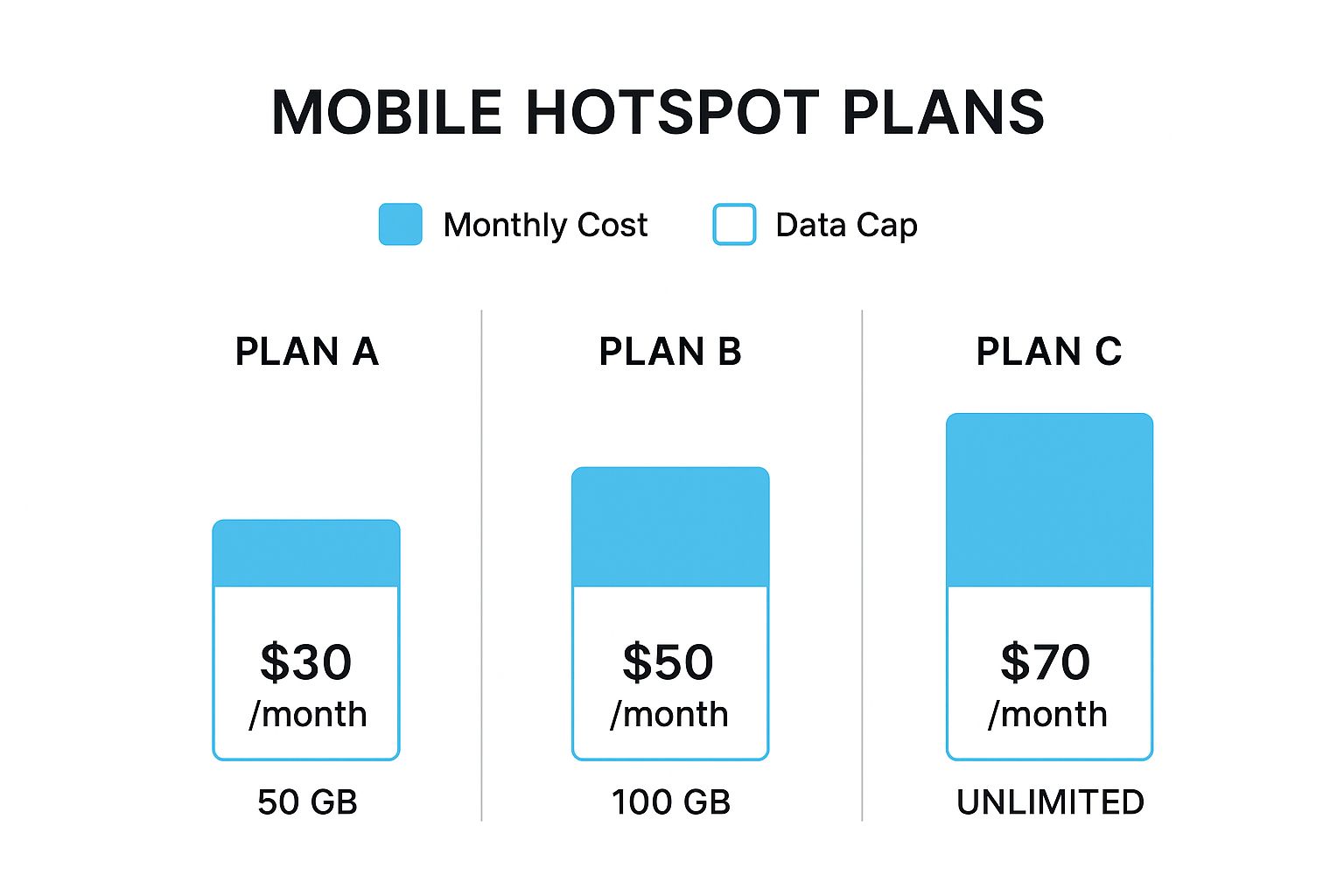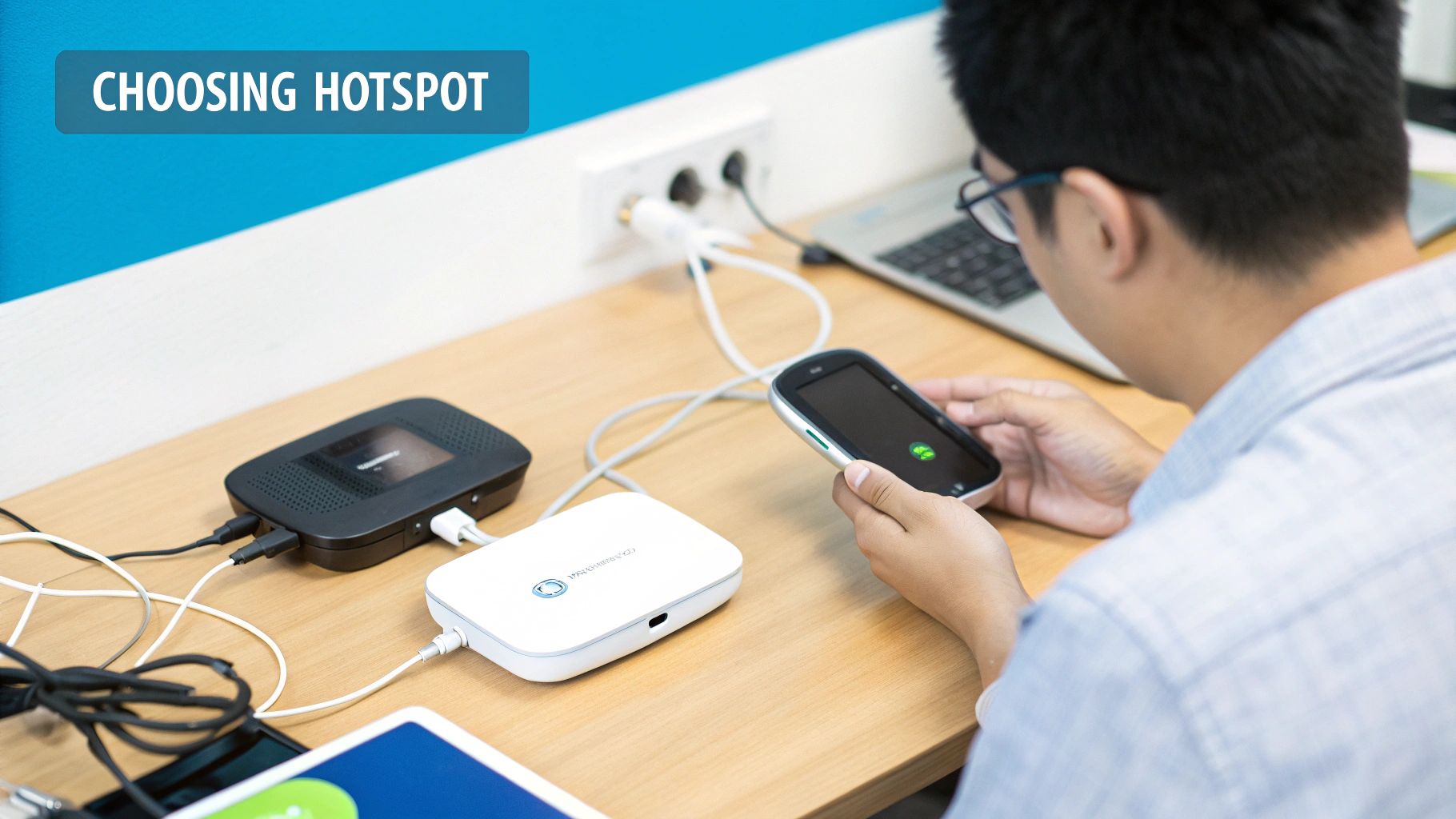

· By James
Your Guide to No Contract Mobile Hotspot Plans
Picture this: you're trying to wrap up a critical work project from a remote cabin, or maybe you're just trying to keep the kids entertained on a long road trip. You try connecting to the local public Wi-Fi, and... nothing. It's slow, unreliable, or just won't connect. We've all been there.
This is exactly where a no contract mobile hotspot steps in to become your personal internet lifeline. These slick little gadgets give you solid internet access without chaining you to a long-term commitment, offering a level of freedom and flexibility that was unheard of just a few years ago.
Your Guide to Internet Freedom on Your Terms
Think of a no-contract mobile hotspot like a prepaid phone plan, but for your internet. You get all the high-speed data you need, but you're in the driver's seat—free to start, stop, or switch up your data plan whenever you feel like it.
This whole model gets rid of that nagging anxiety that comes with being locked into a two-year contract, complete with those dreaded early termination fees. It’s no secret that traditional internet providers consistently rank at the bottom for customer satisfaction, and those restrictive contracts are a huge reason why.
This guide is here to pull back the curtain on these powerful devices. We'll walk you through how they create your own private, secure Wi-Fi bubble pretty much anywhere you can get a cell signal. The concept is refreshingly simple: you buy the hotspot device outright and then purchase data as you go. Need it for a month-long RV trip? No problem. Just a weekend camping getaway? Easy.
Why Is Flexibility So Important?
Being able to control your internet service on your own terms is a total game-changer, especially for folks on the move. It’s not just about dodging a contract; it’s about making your internet costs line up perfectly with what you actually use.
This pay-as-you-go approach is a lifesaver in a few key situations:
- Seasonal Usage: It's absolutely perfect for travelers, RV owners, or anyone with a vacation home who only needs internet for a few months a year. Why pay for what you don't use?
- Cost Control: With prepaid data, you can say goodbye to surprise overage charges. You know exactly what you’re paying for right from the start.
- Backup Connectivity: A mobile hotspot is an essential backup plan. When your home or office internet goes down, you've got an instant, reliable connection to keep you online for work or school.
- No Credit Checks: Most of these no-contract plans don't require a credit check, which makes getting high-speed internet accessible to a lot more people.
By separating the internet service from a long-term financial commitment, a no contract mobile hotspot puts the power right back where it belongs: in your hands. You decide when you need it, how much you need, and when you’re done.
Ultimately, we're going to cover everything you need to know to find the perfect fit for your lifestyle. We'll dig into choosing the right device, comparing the top providers, and figuring out your data needs so you can get out there and enjoy true internet freedom.
How a No Contract Hotspot Actually Works
So, how does that little box in your bag conjure up internet access from thin air? The tech behind a no contract mobile hotspot is actually pretty simple. Just think of it as your own personal, portable router that speaks the same language as your smartphone—the 4G LTE and 5G cellular networks.

At its heart, the whole setup is just two pieces: the physical hotspot device and a SIM card from a cell provider. The hotspot’s job is to grab the mobile data signal from the closest cell tower. The SIM card acts like a key, unlocking access to that provider's network.
Once it makes that connection, the hotspot converts the cellular signal into a private, secure Wi-Fi network that your laptop, tablet, or smart TV can all hop onto.
The "no contract" part is what really changes the game. Instead of getting locked into a 12 or 24-month commitment, you're on a flexible, pay-as-you-go plan. You might buy a chunk of data upfront (like 100GB) or just pay month-to-month, giving you the freedom to stop anytime without getting hit with a penalty.
The Power of a Dedicated Device
You might be thinking, "Can't I just use the hotspot on my phone?" And you can! But while smartphone tethering is fine for a quick connection here and there, a dedicated mobile hotspot has some serious advantages, especially for anyone who relies on it regularly, like RV travelers or remote workers.
It’s like comparing a Swiss Army knife to a specialized tool. Your phone is the multi-tool—it does a lot of things pretty well, but it's not an expert at any single one. A dedicated hotspot is that specialized tool, built for one job: delivering the strongest, most reliable mobile internet connection possible.
This focus translates into some real-world perks:
- Superior Battery Life: Hotspots are packed with larger batteries designed for one thing: broadcasting Wi-Fi. Using your phone as a hotspot absolutely torches its battery, which can leave you phoneless when you need it most.
- Stronger Signal Reception: A dedicated hotspot almost always has bigger, more powerful internal antennas than a smartphone. This usually means a more stable and faster connection—a lifesaver in rural areas or places with spotty service.
- Greater Connection Capacity: Most phone hotspots start to struggle after connecting just a few devices. A no contract mobile hotspot can handle 10, 15, or even more devices at once without grinding to a halt.
- Preserves Phone Performance: Running a hotspot puts a real strain on your phone’s processor. By offloading that job to a separate device, your phone stays cool, responsive, and ready for calls and texts.
A dedicated hotspot isn't just another gadget; it's an infrastructure upgrade for your mobile life. It ensures your primary communication device—your phone—remains fully functional while providing a more robust internet experience for all your other devices.
Unpacking the Technical Magic
So, what's happening inside that box? When you turn on your hotspot, it immediately starts scanning for cell signals from providers like Verizon, AT&T, or T-Mobile. It uses its SIM card to get permission to join the network and establishes a high-speed data connection.
From that point on, it behaves just like your router at home. It creates its own little Wi-Fi bubble with a unique network name (SSID) and password. Any of your devices can then connect to it just like they would at a coffee shop or in your living room. If you want to get into the nitty-gritty, you can explore our detailed guide on how a portable Wi-Fi device works for a full breakdown.
This straightforward process is what makes the no contract mobile hotspot such a powerful tool, giving you a dependable internet connection wherever your travels take you.
The Real Benefits of Cutting the Cord
So, why is everyone suddenly talking about no contract mobile hotspots? It’s about way more than just dodging a two-year service agreement. People are grabbing these devices because they solve real, frustrating internet problems, offering a level of control that traditional providers just can't touch.

This isn’t some niche trend; it’s a major shift in how we think about staying connected. In 2024 alone, households made up nearly 55% of all mobile hotspot router use, proving just how essential these gadgets have become for everyday life. This boom is all about the demand for pay-as-you-go internet—a model that’s a perfect fit for travelers, digital nomads, and anyone who needs a solid connection without the long-term baggage. If you want to dive deeper into the numbers, check out this comprehensive mobile hotspot market analysis.
Absolute Flexibility for Your Lifestyle
The biggest win here is just pure, unmatched flexibility. Let's say you're an RVer who only hits the road in the summer. With a typical internet contract, you'd be stuck paying for service all year long, even when your rig is parked in the driveway for the winter. That just doesn’t make sense.
A no-contract option completely flips that script. You can fire up your service in May, enjoy fast internet on your adventures through September, and then just turn it off when you're done. No calls, no fuss. This seasonal approach saves a ton of money and makes sure your internet bill actually lines up with when you use it.
Total Control Over Your Budget
Prepaid data plans put you in the driver’s seat of your spending. We’ve all been there—that sinking feeling when you open a bill and see a surprise overage charge because you streamed one too many movies.
No-contract hotspots get rid of that financial gut punch for good. You buy a set amount of data upfront—maybe 100GB for $50. Once it’s gone, your service might slow down or pause, but you will never get a surprise bill. You only pay for more data when you decide you need it.
This pay-as-you-go model turns internet from a fixed monthly headache into a simple, on-demand expense. You use what you pay for. Period.
This makes budgeting a breeze, whether you’re a remote worker tracking expenses or a family trying to keep vacation costs in check.
Greater Accessibility for Everyone
Here’s another huge plus: accessibility. A lot of the big internet companies require a credit check to sign up for a contract, which can be a real roadblock for some people.
Most no-contract hotspot plans skip that step completely. Since you’re paying for the service upfront, there’s no financial risk to the company. This opens the door to reliable, high-speed internet for students, folks new to the country, or anyone working on building their credit.
Purpose-Built for Modern Connectivity Needs
At the end of the day, these devices are designed to solve specific problems that traditional internet just can't handle. They aren't just an alternative; for many of us, they're an absolute necessity.
- Reliable Backup Internet: When a storm knocks out your home Wi-Fi right before a big deadline, a mobile hotspot is a lifesaver.
- Connectivity for Nomads: For those of us living the RV life, it's the difference between having a consistent connection at a remote campsite and being completely off the grid.
- Temporary Job Sites: Think construction managers or event planners. They can pop up an instant office anywhere and keep the whole team online and productive.
Ultimately, the freedom of a no contract mobile hotspot is about so much more than avoiding a signature. It’s about finally getting an internet solution that fits your life, not the other way around.
How To Choose Your Perfect Hotspot Plan
Picking the right no contract mobile hotspot can feel like a huge decision, but it gets a lot easier when you know what to look for. Think of it like buying the right tool for a job—you wouldn't bring a tiny hammer to a big construction project, right? Your perfect plan is all about matching the hardware and the data to your specific needs.
This is your roadmap to making a smart choice. We'll walk through the four most important things to consider: carrier coverage, how much data you really need, the device's features, and the total cost. By the end, you'll know exactly how to pick a plan that keeps you connected without any regrets.
Start with Carrier Coverage
Before you even glance at a single hotspot device or data plan, you have to check the carrier coverage. This is the absolute foundation of your decision. A top-of-the-line hotspot with unlimited data is completely useless if you can't get a signal where you actually need it.
In the U.S., most hotspot plans run on one of the "big three" networks: Verizon, AT&T, and T-Mobile. Each one has different strengths when it comes to where their signal reaches.
- Check Their Official Maps: Go straight to the source. Pull up each carrier's website and really study their coverage maps. Don't just type in your home address—zoom in on the places you travel to, like your favorite RV parks, remote work spots, or vacation destinations.
- Look for 5G vs. 4G LTE: Pay close attention to the type of coverage they offer. 5G is blazing fast, but in many rural areas, 4G LTE is still the king of reliable, widespread service. Make sure there’s solid coverage of either type where it counts.
- Talk to Other Travelers: If you're an RVer, this is gold. Hop into forums and Facebook groups for RVers. Real-world experience from people who have actually been on the roads you plan to travel is often way more accurate than a marketing map.
A great plan on the wrong network is a wasted investment. Always prioritize the carrier that provides the strongest, most reliable signal in the places you'll actually be using your hotspot.
Estimate Your Monthly Data Needs
Alright, next up: figuring out how much data you actually burn through in a month. This is where people either spend a fortune on data they never use or, even worse, run out right in the middle of a big project or movie night. Your data appetite directly impacts which plan makes the most sense for your wallet.
So, are you a light user who just needs to check email, or a power user who's streaming 4K movies and on video calls all day? Here’s a quick guide to help you ballpark it:
- Light User (10-50 GB/month): You're mostly checking email, scrolling social media, doing some light web surfing, and maybe streaming some music.
- Moderate User (50-100 GB/month): This is the sweet spot for a lot of people. You’re streaming HD video regularly, working online with some video meetings, and connecting a few devices for daily use.
- Heavy User (100+ GB/month or Unlimited): You’re a digital nomad, a family of streamers, a serious online gamer, or someone who is constantly downloading big files. If this hotspot is your main internet source, you'll almost certainly land here.
This simple infographic shows how a few common no-contract plan types stack up, giving you a good visual on the cost-to-data ratio.

As you can see, the more data you need, the better the value you get on a per-gigabyte basis. This makes the bigger plans a much better deal for anyone who uses a lot of data.
Evaluate Key Device Features
Once you've got your network and data needs figured out, it's time to look at the actual hardware. The hotspot device itself makes a huge difference in your day-to-day experience.
Here are the features you should be looking for:
- 5G vs. 4G LTE: If you're in an area with good 5G, a 5G-capable hotspot will give you a serious speed boost. That said, a high-quality 4G LTE device is still a fantastic—and often more affordable—choice, especially if you spend a lot of time in rural areas.
- Battery Life: How long do you need to be away from a power outlet? If you plan on being on the move all day, look for devices with at least 10+ hours of battery life.
- External Antenna Ports: For many RVers and folks in rural spots, this is non-negotiable. Being able to plug in a powerful external antenna can turn a weak, unusable signal into a rock-solid connection. It's a total game-changer.
- Number of Connected Devices: Check the specs to see how many gadgets the hotspot can handle at once. Most modern devices can support at least 10-15 connections, which is plenty for most individuals and families.
If you're digging into different ways to stay connected, our guide on setting up Wi-Fi on the go with pay-as-you-go plans has more great advice for matching your hardware to your travel style.
Comparing Popular No Contract Hotspot Providers
To give you a better idea of what's out there, we've put together a quick comparison of some popular no-contract options. This isn't an exhaustive list, but it highlights the kind of variety you'll find when shopping around.
| Provider | Network Used | Example Data Plan | Estimated Cost (Monthly/Prepaid) | Key Feature |
|---|---|---|---|---|
| SwiftNet | AT&T / T-Mobile | 300 GB | ~$90 | High data caps, RV-focused support |
| Verizon Prepaid | Verizon | 150 GB | $100 | Strong nationwide 4G LTE coverage |
| T-Mobile Prepaid | T-Mobile | 100 GB | $50 | Excellent 5G speeds in covered areas |
| Straight Talk | Verizon/AT&T/T-Mobile | 100 GB | $55 | Widely available at retail stores |
| Visible | Verizon | Unlimited Hotspot* | $25-$45 | Unlimited data at capped speeds (5Mbps) |
Note: Visible's "unlimited" hotspot is a great value but is typically limited to one connected device at a time and capped at 5 Mbps speeds.
This table shows just how different the offerings can be. Your job is to find the one that hits that perfect balance of network, data, and cost for you.
Calculate the Total Cost of Ownership
Finally, let's talk money. The monthly plan is just one piece of the puzzle. You also have to think about the cost of the hotspot device itself.
You generally have two ways to go about it:
- Buying Unlocked: When you buy a device outright, you have the freedom to pop in a SIM card from any compatible carrier. This gives you the ultimate flexibility but means you'll pay more upfront.
- Carrier-Provided Devices: Sometimes, a carrier will offer a free or discounted device if you sign up for a certain plan. This is great for lowering your initial cost, but it might tie you to that carrier for a while.
The demand for these kinds of flexible internet solutions is exploding. The mobile hotspot router market is expected to jump from $10.1 billion in 2025 to an incredible $46.9 billion by 2035, all thanks to the rise of remote work and the need for reliable internet on the go.
By carefully weighing these four factors—coverage, data, device, and cost—you'll be able to confidently pick the perfect no contract mobile hotspot that keeps you connected without tying you down.
Comparing the Top No Contract Providers and Devices
Trying to sort through all the no contract mobile hotspot providers can make your head spin, but it gets a lot simpler when you break it down. You’ve got everything from the prepaid brands you see on the shelf at Walmart to direct offerings from the big carriers themselves. The real trick is finding that sweet spot—the right blend of network coverage, data allowance, and device features that actually fits how you live and travel.
Let’s take a look at some of the key players out there. We’ll cover what network they run on, what their plans typically look like, and the kind of hardware they offer to give you a real-world picture of your options.

Prepaid Powerhouses and Major Carriers
Some of the easiest no-contract options to get your hands on come from Mobile Virtual Network Operators (MVNOs) and the prepaid divisions of the major carriers. These guys often give you a ton of bang for your buck by piggybacking on the huge networks of Verizon, AT&T, and T-Mobile.
- Cricket Wireless & Straight Talk: These are household names in the prepaid game for a reason. Cricket uses AT&T's network, while Straight Talk is unique in that it partners with all three major carriers. They keep things simple with plans like 100GB of high-speed data for around $50-$55, and you can find their devices just about anywhere.
- Verizon & T-Mobile Prepaid: Sometimes, it pays to go straight to the source. Verizon has a reputation for its massive 4G LTE footprint, which makes it a go-to for many rural users. T-Mobile, on the other hand, often pulls ahead with 5G speeds in more populated areas. Their prepaid hotspot plans pack a punch with high data caps, often climbing to 100GB or even 150GB, though you might pay a little more for it.
When you're weighing these choices, it helps to step back and look at the bigger picture. A solid foundation in understanding how to choose the right internet provider helps you think beyond just the data plan and consider crucial factors like network reliability and customer support.
The World of Unlocked Hotspots
If you want total freedom, an unlocked hotspot is the way to go. This means you buy the device on its own, separate from any carrier. That puts the power in your hands to pop in a SIM card from almost any provider you want. It's the perfect strategy for people who like to chase the best signal or jump on promotional data deals as they come up.
Two devices really stand out in this space:
- Netgear Nighthawk M6 Pro: This is the heavy hitter of unlocked hotspots, a 5G powerhouse. RVers and other power users swear by it for its incredible signal reception, blazing speeds, and pro-level features. If your hotspot is your lifeline to the internet, a serious device like this can be a game-changer.
- Budget-Friendly Unlocked Options: You don’t have to spend a fortune to get a solid unlocked device. Plenty of companies make dependable 4G LTE hotspots that won't break the bank. They might not have the raw speed of a 5G model, but they’re more than enough for everyday work and streaming.
The choice between a carrier-locked device and an unlocked one really boils down to convenience versus control. An unlocked hotspot is an upfront investment, but what you're really buying is the freedom to adapt your setup as you go.
Niche Providers for Specific Needs
Beyond the big names, there are specialized providers who focus squarely on travelers and folks in rural areas. These companies often have plans with massive data caps that you just can't find with mainstream carriers. For anyone living the RV life, this is a corner of the market you absolutely need to check out. Our guide on picking the right mobile hotspot for RV living goes into much more detail on these unique options.
The demand for this kind of flexible internet is absolutely exploding. The mobile hotspot market was valued at around $6.5 billion in 2025 and is set to keep growing, thanks to the boom in remote work and our constant need to be online. That growth is great news for us, as it means providers will keep pushing to offer better gear and more competitive plans.
At the end of the day, picking the right setup is a balancing act. You have to weigh your need for coverage, data, and speed against what you're willing to spend. By exploring what the major carriers offer alongside the freedom of unlocked hardware, you can build the perfect no contract mobile hotspot solution for your life on the move.
Common Questions About No Contract Hotspots
Even after seeing all the benefits, you probably still have a few lingering questions before you pull the trigger on a **no-contract mobile hotspot**. It's totally normal. Let's walk through some of the most common ones so you can make your final call with complete confidence.Performance and Data Needs
The big one I always hear is about performance. Can these things actually handle serious tasks like streaming a 4K movie or hopping into an online game? The short answer is yes, absolutely—but your experience hinges on two key factors: your data plan and the network's latency.
For silky-smooth 4K streaming, you'll want a plan with a generous data allowance and a rock-solid 5G or 4G LTE signal. Gaming, on the other hand, is all about low latency (you might know it as "ping"). For that, you’ll need a carrier that's known for snappy response times.
And what about using a dedicated hotspot versus just flipping on your phone's hotspot feature? The dedicated device is almost always the smarter choice for any serious use. They pack much larger batteries, feature more powerful antennas for pulling in a stronger signal, and can juggle multiple connected devices without bogging down or killing your phone's battery.
Think of your phone's hotspot as a convenient spare tire—it’s perfect for a quick fix or an emergency. A dedicated mobile hotspot is the all-terrain, high-performance tire built for the long haul.
Estimating and Using Your Data
Okay, so how much data do you really need? It's easy to overestimate or underestimate. Here’s a quick cheat sheet to give you a better idea of what you'll use:
- Web Browsing & Email: About 150MB per hour
- HD Video Streaming: Roughly 3GB per hour
- 4K Video Streaming: A hefty 7GB per hour
One last thing: can you pack up your hotspot and take it abroad? Most of the time, U.S.-based plans either won't work overseas or will hit you with sky-high roaming fees. The best move is usually to bring an unlocked hotspot with you and simply buy a local prepaid SIM card when you arrive. It’s the easiest way to get affordable, high-speed data wherever you are.
Ready to find the perfect internet solution for your travels? SwiftNet Wifi offers high-speed 5G and 4G internet designed specifically for RVers and rural residents. Get the reliable connection you deserve at https://swiftnetwifi.com.

